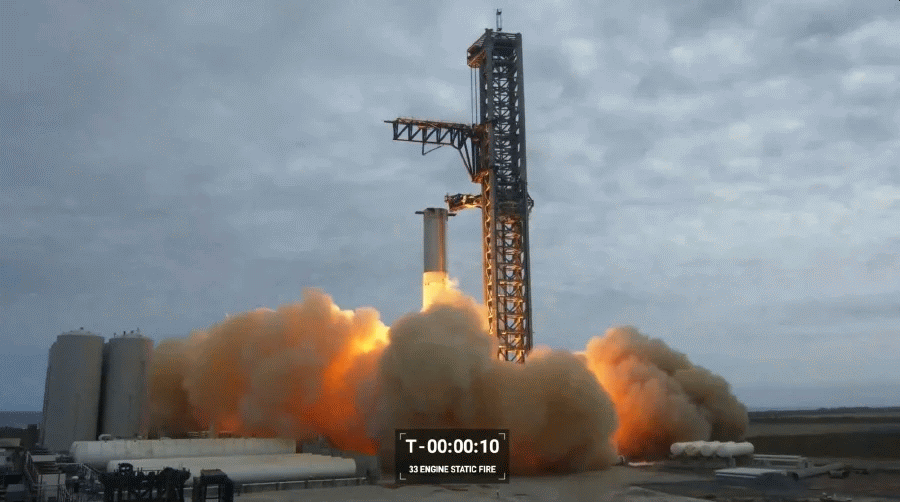Top tech startup news for Thursday, February 9, 2023: Earth & Beyond, GitLab, SpaceX, Yahoo, and ZOLA

Good evening! Below are some of the top tech startup news stories for today, Thursday, February 9, 2023.
SpaceX test-fires Starship booster engine in milestone for debut orbital launch
Today, SpaceX test fires engines on Starship at its facilities in Boca Chica, Texas. Almost 230 feet tall and 30 feet wide, the Super Heavy booster briefly roared to life for the first time on Thursday in a test-firing that puts the behemoth moon-and-Mars vehicle closer to its first orbital flight in the coming months.
Named the most powerful rocket ever, SpaceX fired 31 of all the Super Heavy’s 33 Raptor rocket engines that power its massive Starship launch system ahead of its first orbital launch, a key milestone in the company’s efforts to reach the moon and Mars. Shortly after the test, Elon Musk said in a post on Twitter:
“Team turned off 1 engine just before start & 1 stopped itself, so 31 engines fired overall,” Musk tweeted. “But still enough engines to reach orbit!” Musk also added, “One day, Starship will take us to Mars.”
One day, Starship will take us to Mars https://t.co/oMrnBIiBjY
— Elon Musk (@elonmusk) February 9, 2023
According to SpaceX president and chief operating officer, Gwynne Shotwell, the static fire will pave the way for the rocket’s orbital launch within “the next month or so.”
Super Heavy is a first stage or booster stage and forms the lower part of the rocket and houses up to thirty-three Raptor engines optimized for sea level. Today’s test is remarkable considering that the last test, which was conducted in June 2022, ended in an explosion.
Earth & Beyond Ventures launches fund with $125M in initial funding to invest in Israeli space tech startups
Earth & Beyond Ventures has launched a new early-stage venture fund with an initial funding commitment of $125 million to invest in Israeli tech startups in the emerging commercial space ecosystem.
Earth & Beyond said it would invest between $500,000 to $2 million for seed and pre-seed companies in technologies such as semiconductors, robotics, new materials, sensors, smart farms, quantum computing, solar power, cyber security, and alternative proteins.
Backed by global manufacturing, and space industry conglomerates, the Earth & Beyond Ventures is the first fund of its kind in Israel to focus primarily on supporting deep space explorations and innovations with dual-purpose space and terrestrial applications and aims to boost Israel’s emerging commercial space ecosystem.
Backers for the new fund include Israeli satellite firm SpaceCom, the manufacturer and NASA supplier Corning Inc, Japanese electronics giant Kyocera Corp, and Samtec, a manufacturer of electronic connectivity components. The fund’s general partners include Daniel Recanati, Doron Zauer, Dr. Israel Biran, and Ofer Asif. The group is also backed by the Israel Innovation Authority.
Founded in August 2022 by Daniel Recanati, the Tel Aviv, Israel-based Earth & Beyond Ventures invests in groundbreaking early-stage Israeli innovations as early as first money with the goal of developing the next generation of Israeli deep technology companies and nurturing Israel’s new space ecosystem.
GitLab to cut 7% of its workforce, or about 130 workers, as tech layoffs near 100,000
Gitlab becomes the latest in a long list of tech companies that have announced layoffs this week as the US economy faces headwinds due to the global economic slowdown.
In a message to the company’s employees on Thursday, CEO Sid Sijbrandij cited a “tough” macroeconomic environment and a commitment to “responsible growth.”
“The current macroeconomic environment is tough, and as a result, companies are still spending but they are taking a more conservative approach to software investments and are taking more time to make purchasing decisions,” Sijbrandij said.
GitLab will offer severance that includes a single payout equal to four months of base salary, and accelerated equity vested to affected employees.
“I had hoped reprioritizing our spending would be enough to withstand the growing global economic downturn. Unfortunately, we need to take further steps and match our pace of spending with our commitment to responsible growth,” the CEO told employees.
GitLab joins a rank of other tech companies, large and small, that have laid off staff in recent weeks, including Amazon, Dell, Google Alphabet, and Meta. Just yesterday, Zoom announced it was laying off 15% of its workforce, or about 1,300 employees as its stock fell from its peak of $559 to $85. A day earlier, Dell announced plans to lay off 6,650 workers. In January, Google also said it plans to lay off more than 12,000 workers, while Microsoft revealed it plans to cut 10,000 employees and Salesforce announced plans to lay off 7,000 workers.
With less than two months into 2023, more than 326 tech companies have laid off 98,100 tech workers, according to Layoffs.FYI, a site that has been tracking all tech layoffs using data compiled from public reports.
Tesla-backed renewable energy startup ZOLA Electric unveils FLEX MAX, the world’s largest off-grid solar home solution
Tesla-backed ZOLA Electric today announced the launch of FLEX MAX, its new technology solution that the company said is the world’s largest off-grid solar home solution (SHS) – including the largest battery and solar panel technology.
We news comes less than two weeks after the renewable energy startup appointed former Google Chief Information Officer Ben Fried as a Senior Advisor and member of its Board of Directors. The appointment materially helps ZOLA in its rapid expansion and complements ZOLA’s impact-driven mission – to develop enterprise technology solutions to deliver Energy Equality worldwide.
The launch expands ZOLA’s network architecture by introducing a product that elegantly serves customers living at the convergence of off-grid and on-grid. It fits seamlessly in ZOLA’s network of hardware solutions and, like all ZOLA’s products, is installed, commissioned, optimized, and managed through Vision, ZOLA’s network management software platform.
FLEX MAX serves homeowners looking to power AC appliances such as refrigeration alongside lights, connectivity, TV, and businesses looking to power productive use products. FLEX MAX provides ‘Electrical infrastructure in a box’ for off-grid and peri-urban markets with increased capacity, modular battery, and flexibility to leverage both AC and DC appliances.
FLEX MAX also builds upon ZOLA’s leading distributed energy enterprise platform, the world’s only technology aiming to deliver community-level electrification to the 3 billion people living without affordable, reliable energy. It is an evolution of ZOLA’s plug-and-play solar and storage hybrid power system FLEX, designed for entry-level off-grid basic home appliance usage. In addition to lighting, a TV, and fans, FLEX MAX’s increased capacity can further power high-efficiency AC and DC refrigerators in residential settings, so customers can better store food and minimize spoilage, and extends its application from the domestic to offices and hospitals.
FLEX MAX provides ‘electrical infrastructure in a box’ for customers with no existing connection or those with a weak/unreliable grid connection and not much roof space. Able to charge from both solar and the grid, FLEX MAX is a step up from previous generations, allowing ZOLA to serve both rural communities and the ‘peri-urban’ market. The core value of FLEX MAX is its larger, modular battery and flexibility to leverage both high-efficiency appliances that come with AC as well as infrastructure’s DC systems, so more customers can use existing appliances while benefiting from the versatility of ZOLA’s DC ecosystem.
Yahoo to lay off more than 20% of its workforce
Yahoo announced on Thursday that it plans to let go of more than 20% of its total workforce as part of a major restructuring of its ad tech division. Yahoo said the cuts will affect about 50% of Yahoo’s ad tech employees by the end of this year, including nearly 1,000 employees this week.
The company also added that the move would enable the company to narrow its focus and investment on its flagship ad business called demand-side platform, or DSP. Yahoo is currently owned by private equity firm Apollo Global Management. The firm acquired 90% of Yahoo from Verizon in September 2021 for $5 billion.
The layoffs are part of cut-cutting measures and a broader effort by the one-time Silicon Valley darling to streamline operations in its advertising unit.
A Yahoo spokesperson told CNBC that the company’s business segment’s strategy had “struggled to live up to our high standards across the entire stack.” The spokesperson added: “Given the new focus of the new Yahoo Advertising group, we will reduce the workforce of the former Yahoo for Business division by nearly 50% by the end of 2023,” CNBC reported.
SpaceX disables the Starlink Internet service to control Ukraine’s military drones; Starlink “was never meant to be used as a weapon”
Elon Musk’s SpaceX has disabled the Starlink Internet service to control Ukraine’s military drones, saying that the company’s product “was never intended to be used as a weapon,” Reuters reported.
During a conference in Washington, D.C. on Wednesday, Gwynne Shotwell, SpaceX’s president and CEO, said SpaceX has taken steps to prevent Ukraine’s military from using the company’s Starlink satellite internet service for controlling drones in the region during the country’s war with Russia. She also said that the Starlink satellite internet service was “never never meant to be weaponized.”
“However, Ukrainians have leveraged it in ways that were unintentional and not part of any agreement,” she added.
In addition, Shotwell also told reporters that there were reports that the Ukrainian military had used the Starlink service to control drones. “There are things that we can do to limit their ability to do that,” she said, referring to Starlink’s use of the drones. “There are things that we can do, and have done.”
Meanwhile, a senior Ukrainian official said today that SpaceX must choose between Ukraine and Russia, Reuters reported.
“A year of Ukrainian resistance & companies have to decide: Either they are on the side of Ukraine & the right to freedom, and don’t seek ways to do harm. Or they are on Russia’s side & its ‘right’ to kill & seize territories,” Podolyak wrote.
The decision to curb the use of Starlink satellite internet service in Ukraine comes almost a year after SpaceX provided Ukraine’s military with broadband communications in its defense against Russia’s military.




